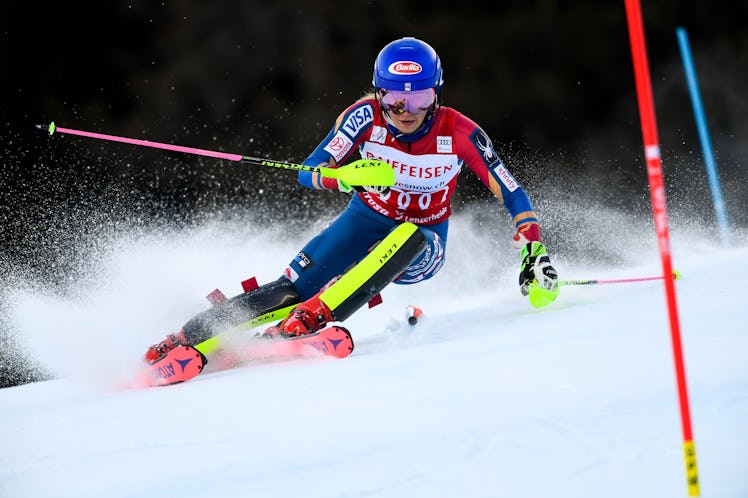
Olympic Skiier Mikaela Shiffrin Reportedly Sleeps For 10 Hours Every Night & Girl, How?
So, it's pretty common knowledge that Olympic athletes are different than the rest of us mere mortals. Beyond whatever innate athletic talent they possess, they also must be driven, willing to work harder than most people can comprehend, and they kind of have to treat their bodies like, you know, temples — or at the very least, well-oiled machines. This is why American Olympic skier Mikaela Shiffrin's sleep schedule and daily routine is so darn impressive, because it achieves things that seem next to impossible for the regular person. Not only does she train enough to make her a contender for three freaking gold medals, she also apparently gets well over eight hours of sleep a night.
That's right, friends. According to a profile on the Olympic athlete published in Outside Online, Mikaela Shiffrin reportedly gets about 10 hours of sleep every night. She also apparently finds time to nap in her busy schedule, which completely blows my mind. The youngest person to win an Olympic gold medal for slalom skiing actually finds time to nap during the day. So, how does she pull all that slumber off? And can she share some of her secrets?
Well, Shiffrin apparently sticks to a pretty tight schedule in general, and as she told Outside Online, while she's obviously concerned with taking home more of those gold medals, she also said she keeps herself centered by trying to make each day a little better than the last one.
One way she makes sure to have enough energy to do exactly that each day? Shiffrin apparently goes to bed every single night at 9 p.m.
No late night shows, no midnight reading, and no club-hoppin' with friends. Shiffrin told Outside Online that she's adamant about her early bedtime, and she takes in the cool 10 hours of sleep by staying under the covers until around 7 a.m. When she wakes up, she always begins her dayw with a hearty breakfast: two fried eggs, toast, and hold the coffee.
As for the rest of her day, Shiffrin reportedly starts a two-hour strength-training workout at around 9 a.m. in her own special corner of the gym at Westin Beaver Creek resort. You better believe she doesn't have any mansplainers showing her how to use the equipment during her strength-training sessions, and she even inspires awe in her fellow gym-goers.
After strength training, Shiffrin has what she calls her "pre-nap pasta," and then she takes her first siesta of the day.
According to the Outside Online profile of the athlete, she takes a lot of naps, and she finds this to be key to recovering from her hardcore workouts.
As it turns out, Shiffrin is apparently not one for socializing very much, which is also another way she makes so much time for getting those extra Z's. While she trains apart and on her own from the rest of the U.S. slalom skiing team most of the time, she does spend about six weeks training with the rest of the team in Park City, Utah.
Shiffrin recalled to the Outside Online journalist that she was flabbergasted that the other teammates wanted to get together to hang out one weekend for a river-floating trip during their downtime:
That takes freaking five hours to float the river. And I’m like, honestly… Do you forget how wonderful it feels to lie in bed and not be doing something in like the two seconds of spare time you have?
To each their own, amirite?
But Shiffrin takes it all the way to gold by being strict about her habits, and she finds the dogged commitment to routine to be the major secret to her success. Ain't nobody going to get in the way of her sleep time, or her training time.
Since the rest of us aren't training for Olympic gold, we can afford to be a little more loose with the rules.
But she does have some pretty good health tips we can incorporate in our own ways. Early to bed, early to rise, get in a good workout, lots of rest, and go easy on caffeine.
I think I can handle some of that, don't you?
Erin Jackson is an inline skating world medalist and roller derby MVP. She dreamed of skating in the Olympics, but to do that, she had to get on ice. She took her first steps on a long-track course in 2016 and started training professionally in September 2017. Four months later, she qualified for the Olympic Winter Games. Check out Elite Daily Insights' video on Jackson's incredible story: